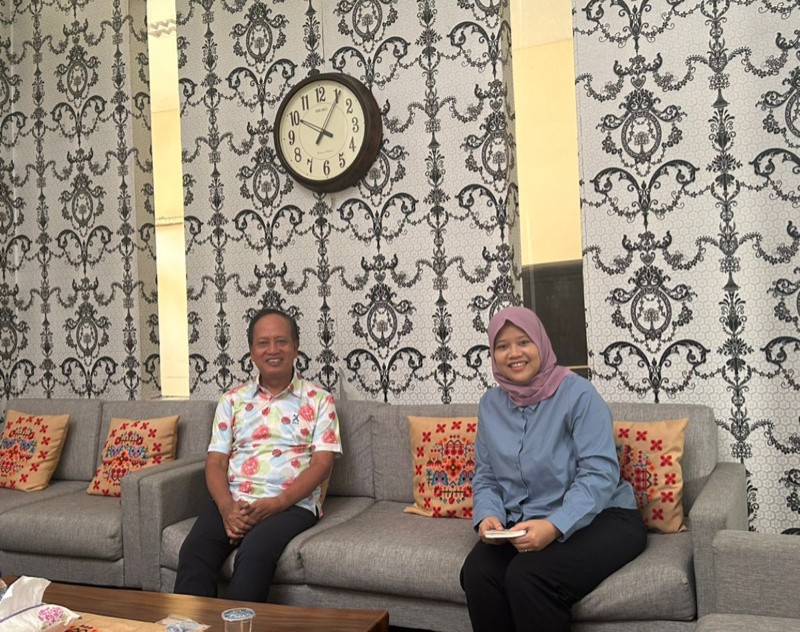UNDIP, Semarang (May 11, 2025) – When we visited Prof. Mohamad Nasir at his home for an interview, he appeared relaxed—a humble academic at heart. Yet, his insights are increasingly sought after to shape the future of higher education in Indonesia. The following is a summary of our exclusive interview with Prof. Nasir regarding his new role as Chair of the National Forum of Board of Trustees (Majelis Wali Amanat / MWA) of Legal Entity State Universities (Perguruan Tinggi Negeri Badan Hukum / PTNBH).
Prof. Nasir, who previously served as Minister of Research, Technology, and Higher Education during the Kabinet Kerja (2014–2019), now holds the position of Chair of the National Forum of MWA PTNBH. It is a strategic role placing him at the center of national higher education policymaking. Just last week, he led a working meeting with the Chairmans of the Board of Trustees from 24 Legal Entity State Universities (PTNBH) across Indonesia, held in Semarang.
For Prof. Nasir, leadership is not about the spotlight. He prefers dialogue, financial reports, and long-term strategies, which he quietly refines. Though he speaks with a calm tone, he holds a bold ambition: to establish PTNBH as a strong pillar of higher education transformation in Indonesia—impactful, resilient, and socially beneficial.
Amid the shifting landscape of higher education, Prof. Mohamad Nasir, Ph.D., Ak., reaffirms his academic commitment. His new role as Chairman of the National Forum of MWA PTNBH not only brings Universitas Diponegoro (UNDIP) into the national spotlight but also serves as a strategic moment to enhance the global competitiveness of Indonesian universities.
“This is a heavy mandate, but I accept it as a way to push PTNBH to compete on the global stage,” Prof. Nasir said in an interview with the team from the Directorate of Media Network, Community, and Public Communication. As Chairman of UNDIP’s Board of Trustees and now the Chairman of the National Forum of MWA PTNBH, he carries a clear mission: to build a healthy, professional governance system that delivers tangible benefits to the public.
In his view, the primary role of the Board of Trustees is not to interfere in academic matters. Instead, he emphasized three strategic non-academic priorities he plans to pursue: finance, assets and human resources, and the endowment fund. “To address these, we’ve formed three commissions: Commission I for Finance, Commission II for Assets and HR, and Commission III for the Endowment Fund,” he explained. He added that this is the first time the MWA PTNBH has been divided into such commissions.
The first goal is to improve asset and financial management so PTNBH does not rely solely on state budgets. Second is optimizing resources—including idle land and faculty succession planning. Third is developing endowment funds to support institutional sustainability and independence.
Speaking on financial governance, Prof. Nasir shared his confidence that improvements are possible through collaboration. Since joining UNDIP’s Board of Trustees, he said, the previously non-existent endowment fund has started to take shape. However, he stressed that such funds must be managed by people who genuinely understand investment. “If you don’t understand it, don’t force it. We need fund managers who are strategic, prudent, and productive.”
He outlined several potential mechanisms for building endowment funds, including strategic partnerships with industry, philanthropic donations, waqf, collaborative research funding, and the allocation of surplus budget funds (Sisa Lebih Pembiayaan Anggaran / SILPA).
Financial independence is critical, he argued, because PTNBH should not rely on student tuition or the Single Tuition Fee (Uang Kuliah Tunggal / UKT). “PTNBH leaders must understand that legal entity status doesn’t mean commercialization. In fact, it should prevent it,” he emphasized. “The role of the Board of Trustees is to ensure non-academic revenue streams—from finance and HR to asset management—without disrupting academic integrity.”
Regarding human resources, he highlighted the current issue of senior professors still classified as civil servants (ASN). Since PTNBH cannot recruit new ASN due to their legal status, succession planning becomes urgent. New academic staff hired under non-ASN contracts place a financial burden solely on the university.
“To avoid this strain, the government must offer support,” he said. “There are two options: reopen conventional ASN recruitment or create a scheme where PTNBH institutions can recruit staff with government funding.” He added that this will be a primary focus of the second commission.
Asked about the concept of a World-Class University (WCU), Prof. Nasir responded clearly: “Rankings are just tools. They’re important because our society uses them as a benchmark, but impact is more crucial. Do our university’s research and innovations reach the people? That’s the real essence of a WCU.” He praised UNDIP Rector for embracing this spirit, referencing the university’s vision: UNDIP, Noble and Valuable.
Prof. Nasir encouraged university leaders to build international collaborations, expand networks, and ensure that academic achievements also contribute to the Sustainable Development Goals (SDGs).
However, he also pointed out regulatory challenges. “Universities are being pushed to climb the global rankings, yet fiscal space is limited. If UKT cannot be raised, the state budget is tight, and asset collaboration policies are lacking, we’re stuck. These regulations must be revised,” he said firmly.

In closing, Prof. Nasir shared his hope for the UNDIP academic community: to unite and push institutional progress. “Don’t think only about yourself. Think about UNDIP’s future. Let it become a policy incubator, a cradle of solutions, and a symbol of national progress.”
With his experience and vision, Prof. Nasir offers not just leadership but a clear direction for the future of Indonesia’s higher education. He embodies an academic leader who not only dreams big but also understands the path needed to reach those dreams. (Public Communications/UNDIP/Nurul)